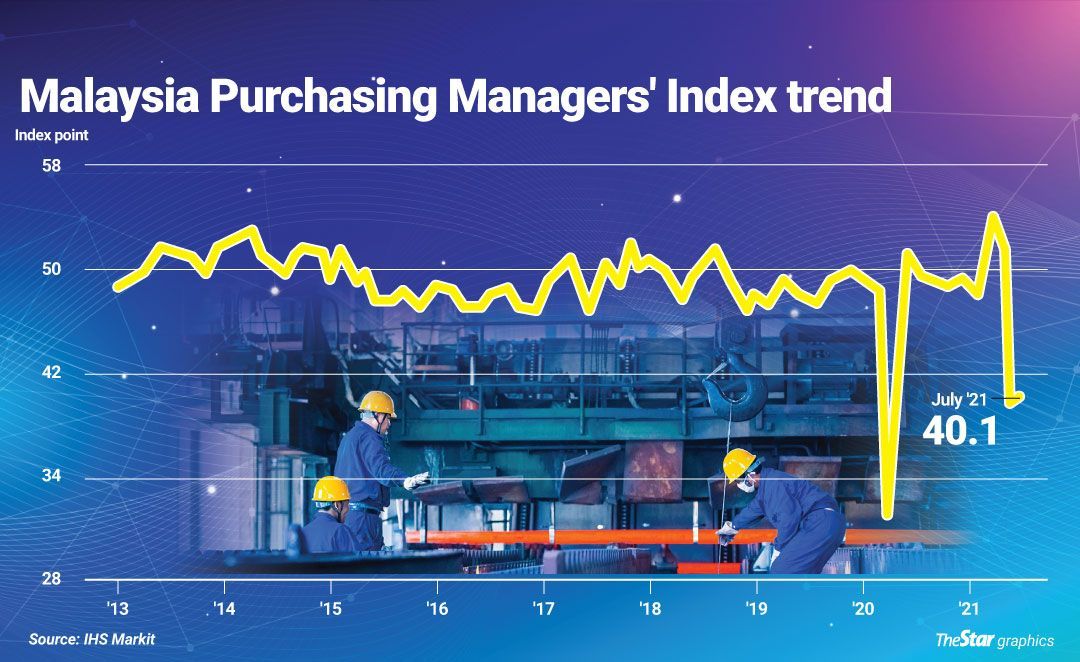Malaysia PMI edges up
PETALING JAYA: Malaysia’s weak manufacturing activities, as measured by the Purchasing Managers’ Index (PMI), reflect signs of a downturn in the country’s industrial production and gross domestic product performance.
This is based on the historical relationship between the PMI and official statistics, according to IHS Markit, which compiled the PMI data.
IHS Markit said the manufacturing sector continued to be badly hit by the Covid-19 contained measures, with production falling sharply for the second consecutive month and new orders moderating further.
In July 2021, the domestic manufacturing activities remained in the contraction territory for the second month as the Purchasing Managers’ Index (PMI) was recorded at 40.1, as compared to 39.9 in June.
Manufacturing activities are deemed to be in expansion mode if PMI is recorded at above 50. The last time Malaysia saw expansion in manufacturing activities was in May 2021, when the PMI was reported at 51.3.
Malaysia is also among the five Asean countries that have suffered a decline in business conditions during July.
On the contrary, only Singapore and the Philippines posted PMI levels of above 50, at 56.3 and 50.4 respectively, according to IHS Markit.
“Overall, the Asean manufacturing sector saw a sharp deterioration in conditions during July. Both output and new orders fell for the second month in a row, with the rates of decline the fastest since May 2020 and steep overall.
“The headline PMI for Asean sank to a 13-month low of 44.6 in July, noticeably further into contraction territory than June’s reading of 49.0,” it said in a note yesterday.Across Asean, IHS Markit said divergence at the country level was again notable, with the most substantial being in Malaysia, Myanmar and Indonesia.
In the case of Malaysia, IHS Markit chief business economist Chris Williamson said that the recent rise in Covid-19 infections has dampened demand and disrupted supply chains.
“Both domestic demand and export orders fell sharply at the start of the third quarter, while supplier delays continued to develop at one of the fastest rates yet recorded by the survey,” he said.
However, Williamson said that there is “better news” in terms of the outlook, as companies are becoming more optimistic after the rise of the Delta variant had pushed confidence in June to its lowest on record.
“More companies are seeing some light at the end of the tunnel, and employment has stabilised,” Williamson said.
Malaysian goods producers, signalling a stabilisation of employment in July, ended a three-month period of job shedding.
“There was also better news on prices.
“Although input cost inflation ticked up slightly, it continued to run well below the steep rates recorded earlier in the year, helping push selling price inflation down to its lowest since February,” according to him.
IHS Markit found that input costs increased for the 14th consecutive month in July, reflecting higher prices for a range of raw materials and higher freight costs.
The overall rate of inflation was steep overall and the quickest since May.
Manufacturers sought to partially pass these higher costs to clients in the form of higher output charges, although the rate of inflation was the softest reported for five months.
Previously, AmBank Group chief economist Anthony Dass told StarBiz that the disruptions in supply chain and logistics, apart from the weak ringgit, would cause production costs to go up.
According to him, there are chances of manufacturers transferring some of the price hike to consumers.
“So far, the manufacturers have been absorbing the extra costs. But, how long can they hold up? Eventually, it will be transferred to the consumers, especially once demand begins to exceed supply,” said Dass, who is also part of the Economic Action Council secretariat.
Bank Islam Malaysia Bhd chief economist Dr Mohd Afzanizam Abdul Rashid concurred that supply bottlenecks may have caused in the build-up of inflationary pressures.
“Nonetheless, government subsidies on fuel may have helped to keep the inflation rate from accelerating further. In June, Malaysia’s consumer price index (CPI) saw a further moderation in inflation rate to 3.4% from 4.4% and 4.7% during May and April this year respectively.
“The general view is that higher inflation rate is expected to be transitory and supply bottleneck could be addressed once the country has migrated into the next phase of the National Recovery Plan (NRP) while the low base factor in last year’s CPI would wear off as we progress through the year,” he adds.
Looking ahead, Mohd Afzanizam expected Malaysia’s PMI to remain below 50 in the immediate terms.
However, he opined that the pace of contraction should reduce as some states including Penang, which is the key player in the manufacturing sector, that has gone into the second phase of the NRP.
“Meanwhile, the recent Producer Price Index (PPI) continues to increase at a double-digit pace since April this year to 11.5% year-on-year in June, with PPI for crude materials for further processing has sustained at 39.2% during the same month albeit moderated from 53.6% in the preceding month,” said Mohd Afzanizam.
Meanwhile, IHS Markit pointed out that Malaysian manufacturers displayed a renewed sense of optimism regarding the outlook for output in the coming year.
This is despite headwinds from supply shortages amid a renewed surge in Covid-19 infections.
“The degree of sentiment was modest overall, but marked a welcome improvement from June’s record low.
“Panel members attributed the improved outlook to hopes that national and international restrictions would lift and aid a recovery in production and sales,” stated IHS Markit.
Source: https://www.thestar.com.my/business/business-news/2021/08/03/malaysia-pmi-edges-up


 Thailand
Thailand







